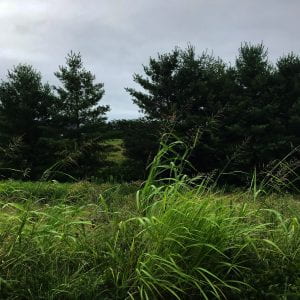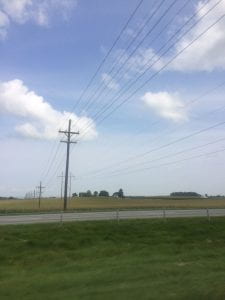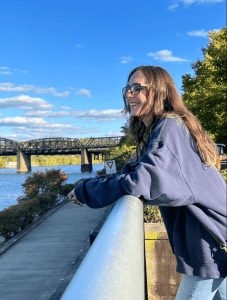

These two images are from my hometown of Turbotville, Pennsylvania. Never heard of it? Yeah, I’m not surprised. It’s one of those small farm towns that’s been the same for at least the past forty years. It’s much like Mayberry. Everyone knows each other. There’s a grocery store, bank, and hardware store in the heart of town; and the only traffic you run into is when you’re stuck behind the Amish with their horse and buggy.
I come from a family of farmers. Some of us are in rural New York on the dairy farm, others are in Pennsylvania. Before then we were Irishmen from Cork, looking for a better opportunity, finding work building America’s railroad network. For us, the landscapes may have changed but by the end of the day, appreciating the world around us and admiring the beauty in nature is one thing my family still values.
I moved around a lot growing up. Each place was somewhere new, in a new state, getting less and less rural every time. None of those places ever felt like home. I was unhappy with my surroundings, felt extremely disconnected, and longed for the same feeling of my tiny little farm town.

Last year I made the move from Charlotte, NC to Pittsburgh, PA. I never saw myself as someone who would love the city but I have never been happier. As I’m writing this I’m coming to the realization that I have always been by a body of water. In Turbotville there’s the Susquehanna River, Charlotte was close to Lake Norman, and now Pittsburgh the city known for its many bridges that cross the Allegheny. All the other places I’ve lived were near a river or lake as well. “Falling in love with a place, being in love with a place, wanting to care for a place and see it remain intact as a wild piece of the planet” is the one thing Williams states in her article that I feel captures the feeling of home (8).
Pittsburgh doesn’t have corn fields that go on for miles, farm animals that are around every corner, or the openness of untouched family land. It does however, have the same sense of community. Every person I have come into contact with has a deep love for this city. Each for varying reasons but their conclusions are all the same. This city feels like home. This city is their family. This city is proud of the mud brown waters that make up the Allegheny.

Kingsolver states “People will need wild places. Whether or not they think they do, they do. They need to experience a landscape that is timeless” (2) and it’s true. Although, I don’t think we need to go to the middle of the woods, with no cell service, to be able to find that sense of wilderness. The beauty of nature is everywhere, we just need to slow down to find it. During the summer I travel back to my tiny farm town and use that as my time to reset. I cannot begin to describe the feeling of happiness when driving down a backroad, windows down, and breathing in all the fresh air.
Cities are often associated with chaos, whereas nature is seen as peaceful, calm. The traditional sense of nature does not exist here but the history does. The night sky still shines bright with all her stars, birds still sing their sweet tune, and the flora still grows. We can all experience the sense of serenity that Kingsolver and Williams speak of, regardless of where we are, if we just take a moment to slow down and appreciate our surroundings.
Ecofeminism stresses the idea that women are connected to nature. Both Kingsolver and Williams present the argument that to be connected to nature we must in fact be surrounded by it. I think this varies person to person and how they define nature themselves. For some it could be a trip to a cabin for some peace while writing, like Kingsolver. Others might share the importance of our histories, like Williams. For me, it’s both. Some days all I can do is walk outside and stand with my bare feet in the grass, listening to the breeze.
I don’t think one thing is greater than the other. For those that live in the city, there are pieces of nature all around them if only they turn off the noise of the concrete jungle. Each experience with nature is valid. No one person will take the same thing away from it as we are all individuals with unique histories.

Ici pas de longues traines mais une coupe cintrée avec une jupe évasée de forme trapèze adaptée à tout
type de danses.
Good post! We are linking to this great article on our website.
Keep up the good writing.
my web-site – apex force
whoah this blog is fantastic i like studying your articles.
Stay up the good work! You recognize, lots of persons are
searching round for this information, you can aid them greatly.
my web site burn flow weight loss reviews
My relatives always say that I am killing my time here at net, but I know I am getting know-how every day by reading such good content.
Feel free to visit my website – ereforce male enhancement
Thanks for your personal marvelous posting! I actually enjoyed reading it, you
happen to be a great author. I will be sure to bookmark your blog and will eventually come back at some point.
I want to encourage continue your great posts, have a nice evening!
Also visit my web page – https://www.cucumber7.com/
Redécouvrez l’essence du style des années 60 avec cette robe noire polyvalente et tendance.
Thanks , I have just been looking for information approximately this
topic for a long time and yours is the best I have found out
till now. However, what concerning the conclusion? Are you certain in regards to the source?
my site: SLG game updates